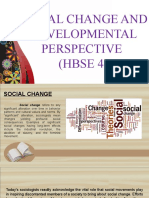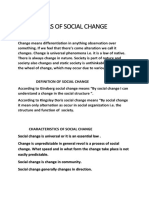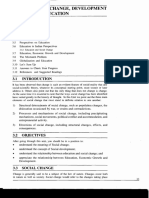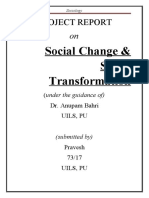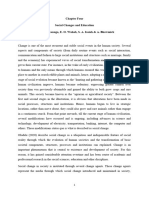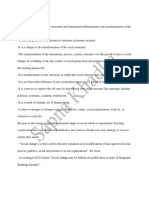0 ratings0% found this document useful (0 votes)
11 viewsUnderstanding Social Change and Social Development
Understanding Social Change and Social Development
Uploaded by
Alvin Jay VargasCopyright:
© All Rights Reserved
Available Formats
Download as PDF, TXT or read online from Scribd
Understanding Social Change and Social Development
Understanding Social Change and Social Development
Uploaded by
Alvin Jay Vargas0 ratings0% found this document useful (0 votes)
11 views25 pagesCopyright
© © All Rights Reserved
Available Formats
PDF, TXT or read online from Scribd
Share this document
Did you find this document useful?
Is this content inappropriate?
Copyright:
© All Rights Reserved
Available Formats
Download as PDF, TXT or read online from Scribd
Download as pdf or txt
0 ratings0% found this document useful (0 votes)
11 views25 pagesUnderstanding Social Change and Social Development
Understanding Social Change and Social Development
Uploaded by
Alvin Jay VargasCopyright:
© All Rights Reserved
Available Formats
Download as PDF, TXT or read online from Scribd
Download as pdf or txt
You are on page 1of 25
Republic of the Philippines
Don Honorio Ventura State University
College of Social Sciences and Philosophy
DEPARTMENT OF SOCIAL WORK
Course: Social Change and
Development Perspectives
(SW B6)
The FUTURE depends
“UNDERSTANDING on what we DO in
the PRESENT.
SOCIAL CHANGE AND – Mahatma Gandhi
SOCIAL
DEVELOPMENT” PETER PAUL R. CABRERA, RSW
Instructor
Understanding Social Change
- Social change is a change in the social structures
and functions of those Structures. The term social
change is also used to indicate the changes that
take place in human interactions and
interrelations. For example Change in Structure
and Functions of family.
- For Maciver and Page, Society is a web of social
relationships and hence social change means
change in the system of social relationships. These
are understood in terms of social processes and
social interactions and social organization.
Understanding Social Change
- Theorist of social change agree that in most
concrete sense of the word “change”,
every social system is changing all the time.
The composition of the population
changes through the life cycle and thus the
occupation or roles changes; the members
of the society undergo physiological
changes; the continuing interactions
among member modify attitudes and
expectations; new knowledge is constantly
being gained and transmitted.
Understanding Social Change
- According to F.E Merill, “Social Change
means that large number of persons
engaging in activities that differ from those
in which they or their parents were engage
some years before”.
- According to Jones, “Social Change is a
term used to described variations in, or
modifications of any aspect of social
processes, social patterns, social
interactions or social organization”.
Understanding Social Change
Social change occurs when societies change their
conditions according to their needs:
✓ Change in Climate
✓ Change in Material
✓ Change in Culture
✓ Change in Governance
✓ Change in Environment
All these things causes society to change into a new
and better living conditions to make life easier.
Understanding Social Change
- Change is the law of nature. What is today
shall be different from what it would be
tomorrow. The social structure is subject to
incessant change.. Individuals may strive for
stability, societies may create the illusion of
permanence, the quest for certainty may
continue unabated, yet the fact remains that
society is an ever changing phenomenon,
growing, decaying, renewing and
accommodating itself to changing conditions
and suffering vast modifications in the course
of time.
Causes of Social Change
- Social change is brought about not by one factor
alone. To be considered are interplay of various social
and non-social factors like geographical location,
topography of the land, climate, soil type, plant and
animal life, and other natural resources, the people’s
motor skills and other abilities, technology,
philosophical, religious, moral, and ethical values,
beliefs, social organization, and other social norms. It is
not only the occurrence and combination of these
factors in a given situation at a given time that brings
about social change. It is also important to take into
account their synchronization harmony, correlation or
reciprocity, coordination or unity, and strains, stresses,
dysfunctions.
Causes of Social Change
- The physical environment does not by itself
cause social or cultural change. It provides
conditions that may or may not induce
change. History gives innumerable
example of the physical environment on
change. Natural disaster have periodically
disrupted life for large populations – loss of
life, destruction of property, migration
patterns, reorientation to different life style.
Factors Influencing Social Change
- SOCIAL MOVEMENT AND SOCIAL REVOLUTION
A social movement originates when either people
are discontent and unhappy with the existing social
system or social order, when people try to establish a new
order of life or a new style of living or when the social
system is established in a condition of unrest.
According to Blumer (1946), social movements
derive their motive from dissatisfaction with the current
form of life and also from wishes and hopes for a new
scheme or system of living.
According to Turner and Killian (1957), a social
movement is a collective acting with some continuity to
promote changes or resist a change in the society or
group of which it is a part.
Factors Influencing Social Change
- COMMON MOTIVATION
In order to make a social movement successful
there is a need to coordinate local attempts and to
make a comprehensive formulation of the causes of
discontentment, the purpose and forms of action to
achieve the goal. A social movement breaks down
without a leader with leadership qualities and its
success also depends upon the co-ordination and
cooperation of the affected members.
A social movement which is the basic cause
behind social change stands on its motivational
base.
Factors Influencing Social Change
- COMMON NEED
Common motivation originates from common
need. When a particular social movement includes
several spheres of living like change in working condition,
right to vote, right to earn, right to information etc. it will
fight for broad changes in social system either through
evolutionary or revolutionary method.
Interested participants of the social movements are
usually those who are directly affected by the existing
social order. But sometimes social and human rights
activities take leading part in social movements without
being directly affected.
Factors Influencing Social Change
- SUFFERING FROM SUPPRESSION AND OPPRESSION
Suppression by the higher socio economic
class of the lower socioeconomic group, suppression
of the low caste by the high caste, by the high rank
employees of its low rank counterparts, rejection of
the genuine demands of the various socially
economically and psychologically disadvantaged
class, and many more problems of a caste and class
based society, racial and communal feeling
produce the urge for social change.
Factors Influencing Social Change
- IMPACT OF COMMUNICATION
Many social changes are influenced by various
electronic and mass medias like TV, Radio, news paper etc.
These agents highlight the woes and sufferings of needy
people and encourage a change in the social order.
People who read papers, listen to Radio or view television;
people who are educated are influenced. They actively or
passively directly or indirectly participate in the process of
social change.
These medias make the common man aware of their
problems, their rights and demands. Their clouded mind is
lighted through their information. Modern day information
technology has helped a lot in this regard.
Factors Influencing Social Change
- EDUCATION
Notwithstanding the fact that education is a
means of communication, education is discussed here
separately as a means of social change because of its
specific importance. Educated people are more
conscious and aware of the positive and negative
points of any social system.
Since education provides knowledge and
knowledge increases mans outlook as well as
rationality and judgment, education acts as a very
powerful force of social change.
Factors Influencing Social Change
- TECHNOLOGICAL CHANGES
Technological advances do influence
the life style, way of living, conduct and day-
to-day behavior of a person becomes more
urbanized than traditional and more
complex than simple. His needs, desire and
life style change suddenly. Under such
circumstances he experiences the urgent
need for a social change.
DEFINITIONS:
Social Welfare – covers practically
everything that men do for the good of
society. “An organized concern of all
people for all people.” Gertrude Wilson.
“The organized system of social services
and institutions designed to aid
individuals and groups to attain
satisfying standards of life and health.
Walter Friedlander .
DEFINITIONS:
Social Welfare includes those
laws, programs, benefits, and
services which assure or
strenghen provisions for meeting
social needs recognized as basic
to the well-being of the
population and the better
functioning of the social order.
Elizabeth Wickenden.
UNDERSTANDING SOCIAL
DEVELOPMENT
- Social development is a multi-disciplinary and cross
sectoral field of practice that seeks to improve the
social and material well-being of people
everywhere (Estes, 1993b; Jones & Pandey, 1981; Lowe, 1995;
Meinert & Kohn, 1987; Midgley, 1995). Social development is
practiced across all geo-political borders and at
all levels of social, political, and economic
organization (Estes, 1990; Hokenstad & Midgley, 1997; Midgley,
1997).
UNDERSTANDING SOCIAL
DEVELOPMENT
- Social development is defined as an approach to
social welfare which offers an effective response to
current social problems (Midgley, 1995).
- Social development differs from social philantrophy,
social work and social administration in several ways.
Unlike philantrophy and scial work, social development
does not deal with individuals either by providing them
with goods or services, or treating or rehabilitating
them. Instead, social development focuses on the
community or the society, and on wider social
processes or structure (Midgley, 1995).
UNDERSTANDING SOCIAL
DEVELOPMENT
- The social development approach is also
comprehensive and universalistic. Unlike social
philanthropy and social work, social development
does not cater only to needy individuals but seeks
to enhance the well-being of the whole
population. Social development is also dynamic,
involving a process of growth and change. Unlike
the other approaches which are primarily
concerned with maintaining adequate levels of
welfare, social development transcends this static
posture by actively promoting a developmental
process.
UNDERSTANDING SOCIAL
DEVELOPMENT
- Social development is a process of planned social
change designed to promote the well-being of
the population as a whole in conjunction with a
dynamic process of economic development
(Midgley, 1995).
UNDERSTANDING SOCIAL
DEVELOPMENT
- The social development approach is also
comprehensive and universalistic. Unlike social
philanthropy and social work, social development
does not cater only to needy individuals but seeks
to enhance the well-being of the whole
population. Social development is also dynamic,
involving a process of growth and change. Unlike
the other approaches which are primarily
concerned with maintaining adequate levels of
welfare, social development transcends this static
posture by actively promoting a developmental
process.
UNDERSTANDING SOCIAL
DEVELOPMENT
- The social development approach is also
comprehensive and universalistic. Unlike social
philanthropy and social work, social development
does not cater only to needy individuals but seeks
to enhance the well-being of the whole
population. Social development is also dynamic,
involving a process of growth and change. Unlike
the other approaches which are primarily
concerned with maintaining adequate levels of
welfare, social development transcends this static
posture by actively promoting a developmental
process.
References:
Midgley, 1995
https://www.slideshare.net/shimilabraham1/social-change-68237326
https://www.snhu.edu/about-us/newsroom/social-sciences/what-is-social-
change
https://www.humanrightscareers.com/issues/what-is-social-change/
https://triumphias.com/blog/social-change/
https://www.psychologydiscussion.net/social-psychology-2/social-
change/social-change-meaning-types-and-characteristics/1446
You might also like
- Report of The Polical Bureau 1987Document7 pagesReport of The Polical Bureau 1987Nigeria Marx LibraryNo ratings yet
- Z12. Ucsp Unit 10 Lesson 3 - Social MovementsDocument3 pagesZ12. Ucsp Unit 10 Lesson 3 - Social MovementsLJ CleminoNo ratings yet
- Social Change and Developmental Perspective (HBSE 4)Document46 pagesSocial Change and Developmental Perspective (HBSE 4)grace100% (4)
- EV CC N2 R134aDocument34 pagesEV CC N2 R134agenas7265No ratings yet
- Wc5945f Service Manual XeroxDocument1,446 pagesWc5945f Service Manual XeroxBruno Paquola90% (20)
- Maam Laraib FinalDocument23 pagesMaam Laraib FinalZahra chatthaNo ratings yet
- Document (2) - 3 PDFDocument16 pagesDocument (2) - 3 PDFSaima GousNo ratings yet
- Lecture No. 6 (Social and Cultural Change)Document9 pagesLecture No. 6 (Social and Cultural Change)Mazhar HussainNo ratings yet
- Change in Social InstitutionDocument4 pagesChange in Social Institutiondj hackerNo ratings yet
- Concepts To Development As FreedomSW2101Document23 pagesConcepts To Development As FreedomSW2101Vance Raphael Anthony S. PRAIRENo ratings yet
- MD Modassir (32) - Ballb Regular - Social ChangeDocument9 pagesMD Modassir (32) - Ballb Regular - Social ChangeMohammad ModassirNo ratings yet
- Social ChangeDocument15 pagesSocial ChangeViconus Biz Trading Company Ltd VBTCL67% (3)
- Factors of Social ChangeDocument5 pagesFactors of Social ChangeUgen Chòdèñ Bhútíá100% (2)
- SOCSCI Group IV Social Change and DevelopmentDocument31 pagesSOCSCI Group IV Social Change and DevelopmentJohn Michael100% (1)
- Social Changes and Social DevelopmentDocument12 pagesSocial Changes and Social Developmentxandriajane27No ratings yet
- Social and Cultural ChangesDocument5 pagesSocial and Cultural Changesrimsha raufNo ratings yet
- Social Change and Elements File 1Document9 pagesSocial Change and Elements File 1Rashedul RashedNo ratings yet
- Impact of Social and Economic Changes in EducationDocument7 pagesImpact of Social and Economic Changes in Educationarchana verma100% (1)
- 9bc55632 1647840460250Document47 pages9bc55632 1647840460250Asfandyar ALiNo ratings yet
- Social Change and UncertainityDocument5 pagesSocial Change and Uncertainityjahanavi12No ratings yet
- Social Change, Development and Education PDFDocument12 pagesSocial Change, Development and Education PDFNitika SinglaNo ratings yet
- Social ChangeDocument24 pagesSocial ChangeRhea Mae DubalNo ratings yet
- A Course Introduction: Appendix B, Course Reference No. 2Document32 pagesA Course Introduction: Appendix B, Course Reference No. 2poloskkNo ratings yet
- Definition and Basic Characteristics of Social ChangeDocument3 pagesDefinition and Basic Characteristics of Social ChangeBilal KhanNo ratings yet
- Social Issues For IAS MAINS 2013 EssayDocument877 pagesSocial Issues For IAS MAINS 2013 Essayzen0987No ratings yet
- Social ChangeDocument10 pagesSocial ChangeMohd AshrafNo ratings yet
- Social ChangeDocument5 pagesSocial ChangeSaqlain HyderNo ratings yet
- How Social Movements Succeed TogetherDocument5 pagesHow Social Movements Succeed TogetherInternational Journal of Innovative Science and Research TechnologyNo ratings yet
- Unit-9 Education and Social ChangeDocument10 pagesUnit-9 Education and Social ChangeChhavi GargNo ratings yet
- Educ 265 VesdDocument3 pagesEduc 265 VesdatoszilphanyNo ratings yet
- Okoye Chapter 1-4 NDocument84 pagesOkoye Chapter 1-4 Nabrahamsunshine177No ratings yet
- Education and Society EssayDocument2 pagesEducation and Society EssayJondelle YlaganNo ratings yet
- Unit 10Document79 pagesUnit 10Litu Priti RanjanNo ratings yet
- Social Change and Media - Taimoor TKDocument44 pagesSocial Change and Media - Taimoor TKmuhammadtaimoorkhan100% (2)
- Socialogy AssignementDocument11 pagesSocialogy AssignementshivendraNo ratings yet
- Social Change and FactorsDocument4 pagesSocial Change and FactorsKhurram JuttNo ratings yet
- Day 3 - Social Change - in DepthDocument36 pagesDay 3 - Social Change - in DepthFfrekgtreh Fygkohk100% (1)
- SG1542Document54 pagesSG1542Sachin100% (1)
- Social Change & Social TransformationDocument16 pagesSocial Change & Social TransformationPravesh Bishnoi100% (1)
- Devlibrary - in-NIOS Class 12 Sociology Chapter 18 Processes of Social ChangeDocument10 pagesDevlibrary - in-NIOS Class 12 Sociology Chapter 18 Processes of Social ChangeAnushkaNo ratings yet
- Social and Culural ChangeDocument18 pagesSocial and Culural Changeunickcode221No ratings yet
- SOCIOLOGY-SOCIALl CHANGE. LECTURE # 09.Document32 pagesSOCIOLOGY-SOCIALl CHANGE. LECTURE # 09.abdul rehmanNo ratings yet
- UntitledDocument13 pagesUntitledArindam PrakashNo ratings yet
- SOCIALCHANGEANDEDUCATIONDocument17 pagesSOCIALCHANGEANDEDUCATIONlloydkimbab01No ratings yet
- Social Change in Mun - Gov. Gen Dvo Or.Document5 pagesSocial Change in Mun - Gov. Gen Dvo Or.Cristine Guimare HermosaNo ratings yet
- 3 Social, Political, and Cultural ChangeDocument3 pages3 Social, Political, and Cultural ChangeJellie Ann Jalac83% (23)
- Ucsp Lesson 4Document14 pagesUcsp Lesson 4Hannah MartinezNo ratings yet
- Hbse 4Document3 pagesHbse 4gheljoshNo ratings yet
- Human Behavior and Social Change 1Document31 pagesHuman Behavior and Social Change 1hannah grace eataNo ratings yet
- Introduction To Social ChangeDocument26 pagesIntroduction To Social ChangeDsk ReddyNo ratings yet
- Social Change: Characteristics and Factors: MeaningDocument27 pagesSocial Change: Characteristics and Factors: MeaningVenkata Vineeth100% (2)
- Objectives: Social and Cultural ChangesDocument3 pagesObjectives: Social and Cultural ChangesMarby MaybituinNo ratings yet
- SocioDocument6 pagesSociocatherine tabuclinNo ratings yet
- Sociology EducationDocument9 pagesSociology EducationDavid Lwanga100% (1)
- How It Happens and How To Make It Happen: by Scott LondonDocument9 pagesHow It Happens and How To Make It Happen: by Scott LondonIan Kenneth AcostaNo ratings yet
- Social Development and Social ChangeDocument7 pagesSocial Development and Social ChangeRiza RoncalesNo ratings yet
- Social Problems and Social ChangeDocument57 pagesSocial Problems and Social ChangeJayvee Ayeras100% (1)
- Social Change and Social Order Notes Class 11Document6 pagesSocial Change and Social Order Notes Class 11vedaketshahaNo ratings yet
- SociologyDocument5 pagesSociologyjaverya15No ratings yet
- Social Change in SociologyDocument29 pagesSocial Change in SociologyKesiyamol MathewNo ratings yet
- Social Change and EducationDocument4 pagesSocial Change and EducationIzna100% (1)
- Unit FiveDocument32 pagesUnit FiveAnimal KingdomNo ratings yet
- Astronomy QuestionDocument3 pagesAstronomy Questionapi-374038512No ratings yet
- Example of Bit StuffingDocument5 pagesExample of Bit StuffingpradeeperukullaNo ratings yet
- Concept SummaryDocument15 pagesConcept SummaryRushabh ShahNo ratings yet
- 5 Solas of The Reformation PDFDocument2 pages5 Solas of The Reformation PDFLalpu Hangsing100% (3)
- Hylasome EG10 SS 2020Document2 pagesHylasome EG10 SS 2020Jesus CanteroNo ratings yet
- Development 1Document14 pagesDevelopment 1kashifbutty2kNo ratings yet
- Shock Waves by Fleur McDonald ExtractDocument36 pagesShock Waves by Fleur McDonald ExtractAllen & UnwinNo ratings yet
- Heat Evolution Due To Cement Hydration in Foamed Concrete: Magazine of Concrete Research December 2010Document13 pagesHeat Evolution Due To Cement Hydration in Foamed Concrete: Magazine of Concrete Research December 2010Chaitanya IdateNo ratings yet
- Data Sheet of Clean Water Testing Environment Laboratory of PT - SucofindoDocument6 pagesData Sheet of Clean Water Testing Environment Laboratory of PT - SucofindobellaNo ratings yet
- DANGANTAKAR ZUCI..1 To..... - 1-1-1Document221 pagesDANGANTAKAR ZUCI..1 To..... - 1-1-1fatimamuhdsani34No ratings yet
- 40 / Sarai Reader 2002: The Cities of Everyday Life: Parsi Theatre and The City Locations, Patrons, AudiencesDocument8 pages40 / Sarai Reader 2002: The Cities of Everyday Life: Parsi Theatre and The City Locations, Patrons, AudiencesManali TalakeNo ratings yet
- RTB FP 03 006 Despatch Loading BinDocument1 pageRTB FP 03 006 Despatch Loading BinSeapara SathekgeNo ratings yet
- Interpretation of TransitsDocument14 pagesInterpretation of TransitsMurthy ChvsnNo ratings yet
- Mogul GardensDocument2 pagesMogul GardensDanish S MehtaNo ratings yet
- Posttraumatic Psychological Symptoms Are Associated With Reduced Inhibitory ControlDocument11 pagesPosttraumatic Psychological Symptoms Are Associated With Reduced Inhibitory ControlChristian Vaca LopezNo ratings yet
- TJ 7003Document2 pagesTJ 7003Vidyadhar BommeriNo ratings yet
- Vacuum CleanerDocument17 pagesVacuum CleanerMarshall-tendai Zifa-sire Zuku-chibikaNo ratings yet
- Group 2 Drainflow CaseDocument13 pagesGroup 2 Drainflow CaseNam SơnnNo ratings yet
- Student ManualDocument55 pagesStudent ManualL'VNo ratings yet
- 2502 Mathematics Paper With Solution MorningDocument8 pages2502 Mathematics Paper With Solution MorningRaja LakshmiNo ratings yet
- On The Thermal Behavior of Aluminum Reduction Cell During Electrical PreheatingDocument8 pagesOn The Thermal Behavior of Aluminum Reduction Cell During Electrical PreheatingMitone DiazNo ratings yet
- Letter To Parents - Case StudyDocument2 pagesLetter To Parents - Case StudyFranz Allen RanasNo ratings yet
- Natasha Nicolle Alderite 5272196 0 1Document6 pagesNatasha Nicolle Alderite 5272196 0 1Badass LadyNo ratings yet
- Philippine Integrated Disease Surveillance and Response: Admitted in Multiple Health FacilitiesDocument5 pagesPhilippine Integrated Disease Surveillance and Response: Admitted in Multiple Health FacilitiesVanzNo ratings yet
- Zurich AxiomsDocument20 pagesZurich AxiomsAdel OmarNo ratings yet
- Applied Economics Module 1Document30 pagesApplied Economics Module 1愛結No ratings yet
- Wolfson Eup3 Ch32 Test BankDocument21 pagesWolfson Eup3 Ch32 Test Bankifghelpdesk100% (2)


